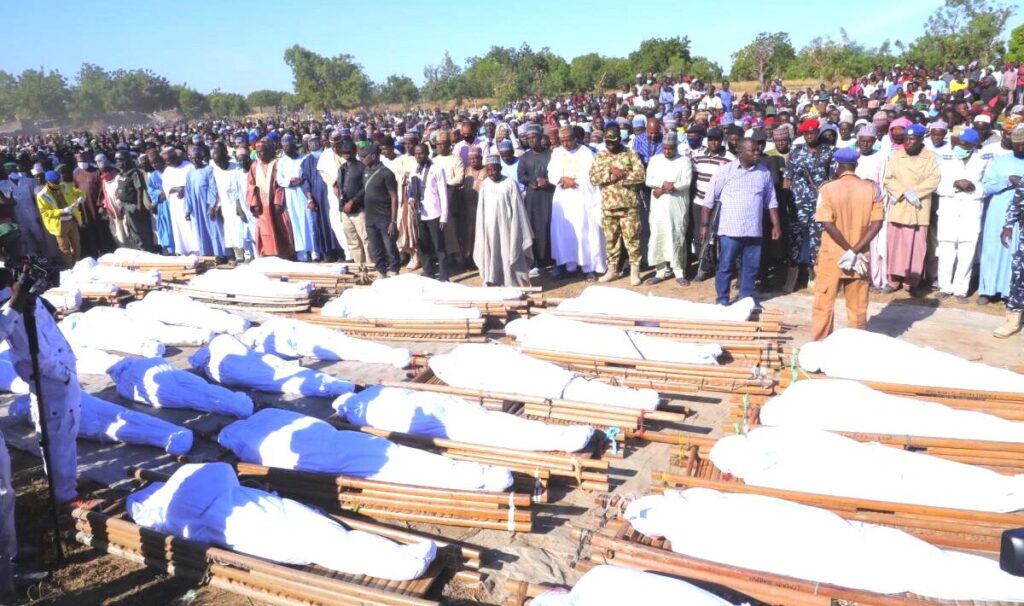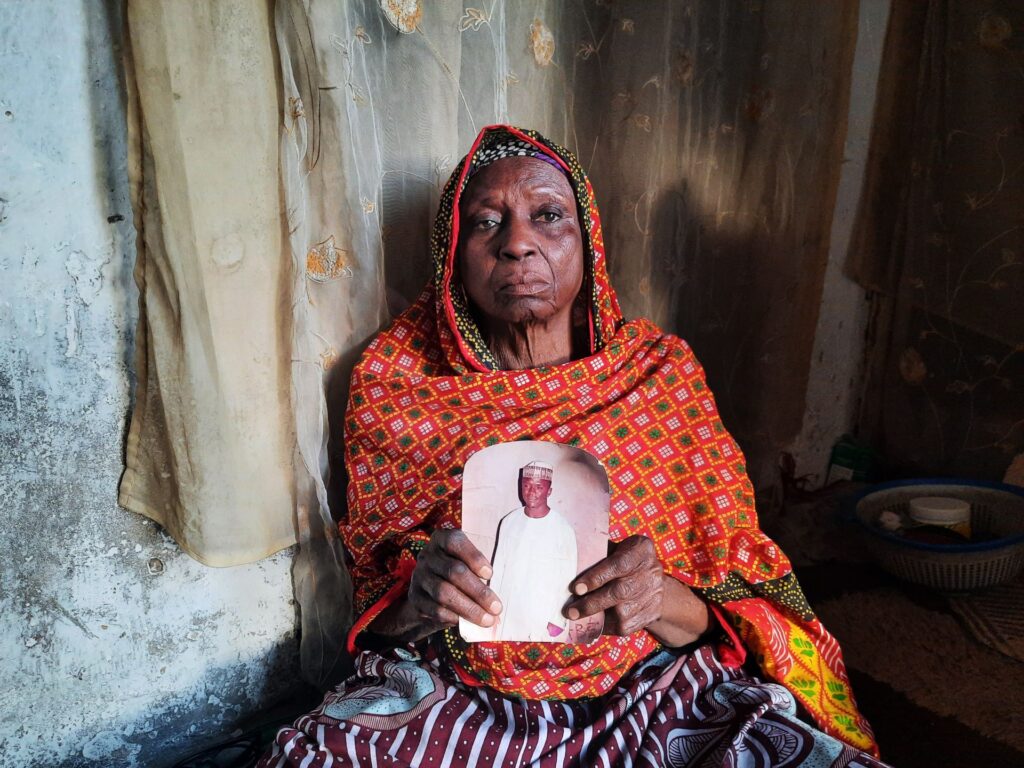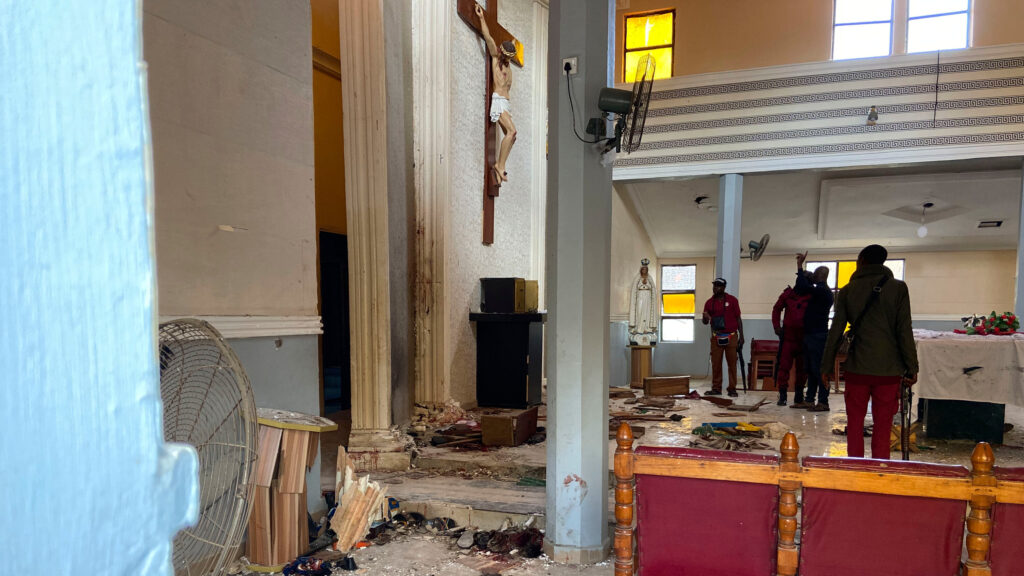The recent massacre in Benue State’s Yelewata community, Guma Local Government Area, Nigeria, which occurred between June 13 and 14, 2025, has drawn significant attention due to its scale and brutality. Below is a detailed overview based on available information, including the search results provided, addressing the specifics of the incident and clarifying that no reports of beheadings were mentioned in relation to this event.
Overview of the Yelewata Massacre
Date and Location: The attack took place from late Friday, June 13, into early Saturday, June 14, 2025, in Yelewata, a community in Guma Local Government Area, near Makurdi, Benue State, Nigeria.
Casualties: Estimates of deaths vary across sources:
- Amnesty International Nigeria reported at least 100 people killed.
- Other sources, including Vatican News and local reports, cite up to 200 deaths, with many victims being internally displaced persons (IDPs) sheltering at a Catholic mission.
- Official figures from police and government sources are lower, with some reports mentioning at least 45 deaths.
- A survivor, Michael Ajah, claimed 20 of his family members were burned alive.

Nature of the Attack:
- Gunmen, identified by survivors and officials as suspected Fulani herders, stormed the community at night, targeting sleeping villagers. They opened fire, set homes and buildings ablaze, and used machetes on those attempting to flee.
- The attackers reportedly shouted “Allahu Akbar” during the assault, suggesting a possible religious motive, though economic and land disputes are also cited as drivers.
- The assailants first engaged security forces, overpowering police and military personnel before targeting civilians
- Many victims were IDPs who had sought refuge in Yelewata, considered relatively safe due to its location on a main road to Abuja.
Damage: Homes, stores, and farming equipment were burned, leaving the community devastated. Survivors fled to nearby towns like Daudu and Abagena.
No Reports of Beheadings
Clarification: Despite the user’s query about “beheading in Africa,” there are no credible reports or mentions of beheadings in the Yelewata massacre or other recent Benue State attacks in the provided sources or broader news coverage. The violence involved shootings, arson, and machete attacks, but beheadings were not specified.
Context: The absence of beheading reports aligns with the nature of the attack, which focused on mass killing and destruction rather than specific acts of decapitation. Claims of beheadings in other African contexts, such as the unverified X posts about the Democratic Republic of Congo, are unrelated to this incident and lack substantiation.

Broader Context: Herder-Farmer Conflict
- Root Causes:
- The Yelewata massacre is part of a long-standing herder-farmer conflict in Nigeria’s Middle Belt, particularly Benue State, driven by competition over land and resources between nomadic Fulani herders (mostly Muslim) and settled Christian farming communities.
- Religion and ethnicity exacerbate tensions, with some framing the violence as “ethnic cleansing” or “jihadist” attacks, though Fulani leaders deny religious motives.
- Economic factors, including climate change and desertification pushing herders south, also contribute
- Historical Toll: Amnesty International and the Internal Displacement Monitoring Centre estimate over 5,000 deaths and 1.5 million displacements in Benue State over the past decade. Between May 2023 and May 2025, 1,043 people were killed in Benue, per Beacon Security.
- Recent Escalation: Benue has seen multiple attacks in 2025, including 20 deaths in Gwer West in May and earlier massacres in Katsina-Ala, Ukum, and Logo LGAs.

Response and Reactions
Government and Security:
- President Bola Tinubu visited Makurdi on June 18, 2025, to console survivors at Benue State University Teaching Hospital and meet stakeholders. He ordered the arrest of the perpetrators and urged Governor Hyacinth Alia to form a peace committee.
- The military deployed air surveillance, and the Inspector-General of Police sent Special Forces to track the attackers, who were reportedly moving toward Lafia, Nasarawa State.
- The Benue State House of Assembly declared three days of mourning (June 18–20, 2025) and condemned the attack as “genocide.”
International and Religious:
- Pope Leo XIV condemned the massacre during his Sunday Angelus on June 15, 2025, praying for the victims, mostly IDPs at a Catholic mission.
- Amnesty International Nigeria called for justice and an end to the “almost daily bloodshed” in Benue.
Local and Advocacy:
- The Miyetti Allah Cattle Breeders Association (MACBAN) condemned the attack but criticized ethnic profiling of Fulani herders, claiming 57 herders were killed and over 4,348 cattle stolen in Benue in 2025.
- Activists like High Chief Sobomabo Jackrich urged President Tinubu to establish a judicial inquiry and reform Nigeria’s security architecture.
Public Sentiment: X posts reflect outrage, with some calling for aerial bombardments of attacker enclaves or labeling the violence as religiously motivated. Others highlight the government’s failure to act decisively.
The Yelewata massacre is part of a long-standing herder-farmer conflict in Nigeria’s Middle Belt, particularly Benue State, driven by competition over land and resources between nomadic Fulani herders (mostly Muslim) and settled Christian farming communities.
Massacre in Benue State’s Yelewata community, Guma Local Government Area, Nigeria, which occurred between June 13 and 14, 2025

Impact and Outlook
- Humanitarian Crisis: The attack displaced thousands, exacerbating Benue’s IDP crisis. The State Emergency Management Agency was urged to provide shelter and relief.
- Food Security: Benue, known as Nigeria’s “Food Basket,” faces disrupted agriculture, threatening national food supply chains.
- Security Challenges: The attackers’ ability to overpower security forces and escape highlights systemic weaknesses, prompting calls for proactive intelligence and preventive measures.
- Political Pressure: President Tinubu’s visit signals federal attention, but critics, including the Nigerian Catholic Network, question the government’s inaction and possible complicity.
Connection to AI and Border Security
While the user’s previous queries focused on AI and border security, the Yelewata massacre underscores the need for advanced surveillance technologies, such as AI-powered cameras, to monitor Nigeria’s porous borders and prevent such attacks. The infiltration of attackers via a river suggests gaps in border monitoring that AI systems, like the MVP described earlier (using YOLOv8 and Raspberry Pi), could address by detecting unauthorized movements in real-time. However, no direct mention of AI use in this incident was found.
Conclusion
The Yelewata massacre, with 100–200 deaths, is a tragic escalation of Nigeria’s herder-farmer conflict, marked by shootings, arson, and machete attacks but no reported beheadings. It has prompted high-level government action, international condemnation, and calls for justice, yet systemic issues persist. The incident highlights the urgency of deploying technologies like AI cameras for border security to prevent future attacks, particularly in conflict-prone regions like Benue.

Comments